Birthright Israel Publications
Journal article
December 2025
Ensuring that Jewish educational initiatives address the growing diversity of the US Jewish community requires, in part, understanding the background characteristics of participants and how a given educational program affects the trajectory of Jewish engagement for those with little, moderate, or a substantial amount of prior Jewish education and experiences. The present paper undertakes this analysis using the example of Birthright Israel. First, using latent class analysis, we develop a data-informed typology for classifying different religious and cultural childhood experiences of American Jewish young adults. We then examine the extent to which each group in the typology is impacted by participation in Birthright Israel, using an analytic approach that compares pre- and post-trip responses for both individuals who participated in Birthright Israel and a comparison group of those who applied but did not participate. We find that for some measures, Birthright Israel has a significant impact on participants with a variety of background experiences, while for other outcomes, Birthright Israel’s impact is concentrated among those with the least exposure to Jewish life. Contemporary Jewry (2026) 46:1. https://doi.org/10.1007/s12397-025-09693-8
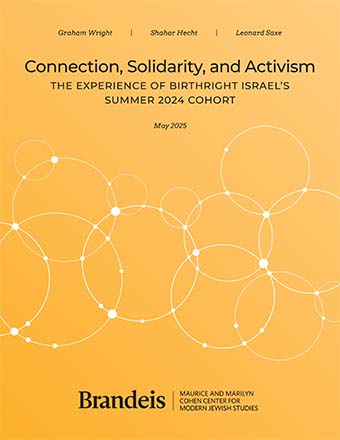
May 2025
Report
In summer 2024, Birthright sent over 4,500 young American Jews to Israel on 10-day, peer-educational trips, just as it had been doing since 2000. Unlike at any other period, these young Jews chose to go to Israel while multiple military conflicts were ongoing, and when a spike in antisemitic hostility related to criticism of Israel was occurring at many of the college campuses they attended. The unprecedented context of summer 2024 trips raises important new questions about the Birthright program and US Jewish young adults in general. This report explores the kinds of young Jews who chose to apply to Birthright during this challenging summer and participants' beliefs when they arrived in Israel. The report also examines whether the quality of the experience was disrupted by the war, the extent to which the Birthright trip influenced participants' relationship to Israel, and the trip's effect on their responses to hostile discourse surrounding Israel after returning to the United States.
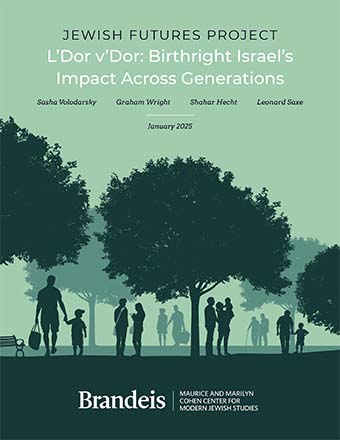
Report
February 2025
The Jewish Futures Project (JFP) has been following a panel of respondents who applied to go on a Birthright Israel trip between 2001 and 2009. The panel includes Birthright participants, and others who applied to the program but did not go. The findings from the JFP’s seventh wave document the stability of Birthright’s impact on many domains of Jewish life, including participants’ relationship to Israel and their Jewish religious and social engagement. A particular area of exploration is Birthright’s impact on choices participants make about the Jewish education and socialization of their children.
Data for the seventh wave of the study were collected through an online survey that took place between May 2023 and January 2024. A total of 2,218 panelists responded to the survey, representing an overall response rate (AAPOR RR2) of 40% (59% for Birthright participants and 31% for nonparticipants).
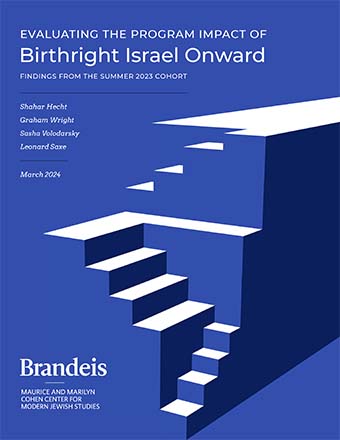
Report
April 2024
Birthright Israel Onward (Onward) offers Jewish young adults an opportunity to participate in a fellowship or to gain professional experience working in an Israeli organization while deepening their connection to Israel, their Jewish identity, and their Jewish peers. Designed as a second experience in Israel, Onward is experienced either as an extension program to a ten-day Birthright trip (“Birthright & Onward”) or as a stand-alone program (“Onward Only”) primarily for individuals who have already been to Israel on Birthright or under other auspices.
This report summarizes findings from the pre-trip and post-trip surveys of summer 2023 applicants to Onward and Birthright Israel. The evaluation focused primarily on the educational experience of the programs and their impact on participants’ Jewish and Israel connections.
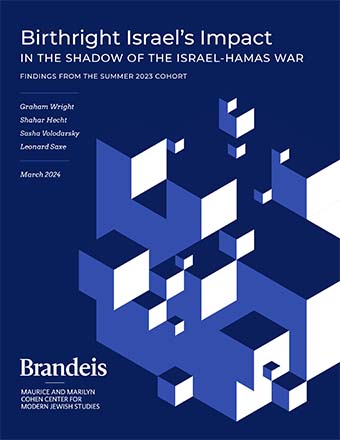
Report
April 2024
In the summer of 2023, over 10,000 Jewish young adults from the United States participated in a Birthright Israel trip. For 10 days they experienced and learned about Israel by visiting historical and cultural sites, hearing about Israel’s history as well as contemporary life, and exchanging views with their Israeli peers (many in the IDF). These trips took place before Hamas’ brutal October 7 attack and the start of the Israel-Hamas war. In the wake of October 7th, and the intense animosity directed at Israel around the world, recent Birthright alums encountered a new reality. How did these events influence how they understood their personal experiences in Israel? How did their Birthright experience impact how they thought and felt about the war and Israel’s actions? How did participation in Birthright impact Jewish identity and Jewish connections in a world of heightened antisemitism, where “being Jewish” meant something very different than it did in the summer of 2023?
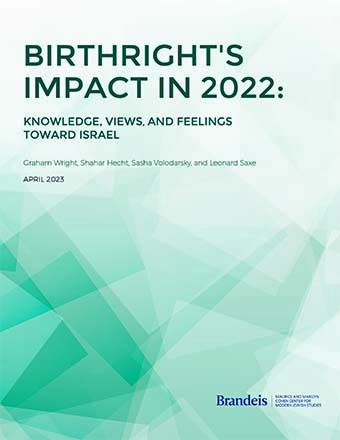
Report
May 2023
This report documents the impact of Birthright Israel on the US Jewish young adults who participated in summer 2022 Birthright Israel trips. Given that the trips took place in the context of rising political tensions in the United States and Israel, the report examines whether these dynamics hindered trip participants from developing a strong emotional connection to Israel. Did the program help participants understand the complex political situation in Israel? Did the trip influence how participants see Israel’s political and security situation? Did the program change how participants relate to groups involved in Israel-related activism?
Journal article
December 2022
In this paper we use data from the 2020 Pew survey to assess the program’s “reach” into different segments of the American Jewish population and to extend the validity of existing findings regarding the program’s impact on participants’ attitudes and behaviors related to Israel and Jewish life. Contemporary Jewry (2022) https://doi.org/10.1007/s12397-022-09467-6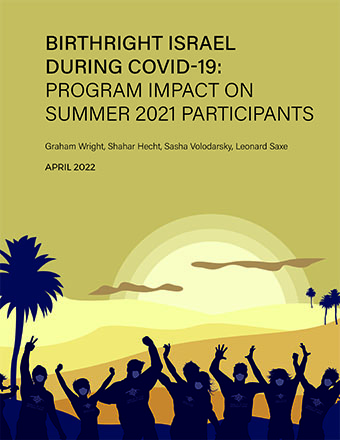
Report
April 2022
This report documents the impact of Birthright Israel in the context of the COVID-19 pandemic and the aftermath of the May 2021 Israel-Hamas conflict. The findings draw data collected in pre- and post-trip surveys of US Jewish young adults who applied to go on summer 2021 Birthright Israel trips. The analyses examine changes in attitudes and behaviors among participants and nonparticipants. Despite the disruptions of the pandemic and the lingering tensions of the conflict, overall evaluations of the summer 2021 trips were extremely positive, and the impact of the program remained robust.
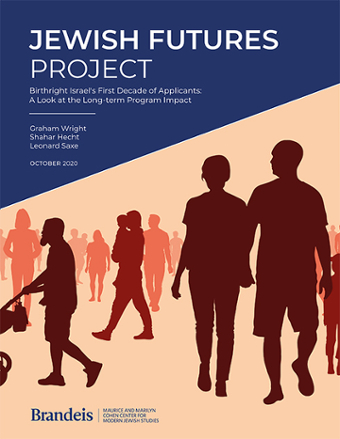
Report
November 2020
The Jewish Futures Project (JFP) has been following multiple cohorts of Birthright participants, and others who applied to the program but did not go, for over a decade. In the sixth wave of the JFP study, we explore whether Birthright’s long-documented impact on connection to Israel and engagement in Jewish life persists, as participants grow older, and the trip recedes further in their memory.
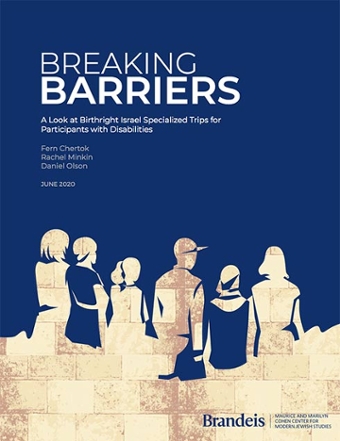
Report
June 2020
Birthright Israel trips have emerged as the normative “coming-of-age” experience for contemporary Jewish young adults. Birthright Israel has made a commitment to making its ten-day educational experiences accessible for young adults with a variety of specialized needs stemming from life-threatening or chronic illnesses, physical and sensory impairments, and cognitive and developmental disabilities
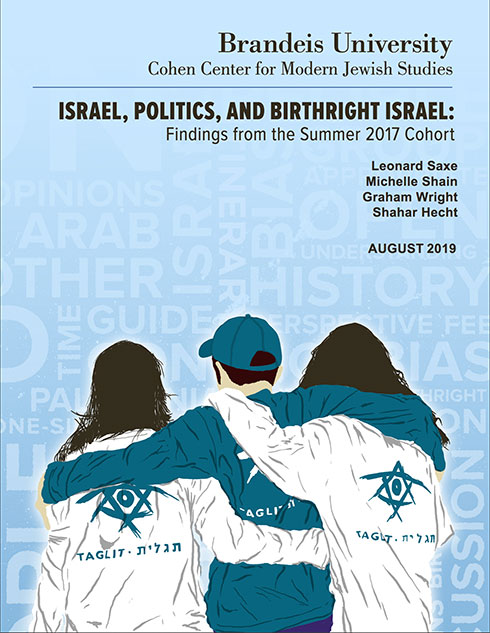
Report
August 2019
This report assesses Birthright’s effectiveness in providing a balanced educational program to participants from diverse backgrounds. The report examines Birthright’s impact on the summer 2017 cohort’s feelings of connection to Israel, engagement with Israel, and views regarding particular Israeli policies and investigates whether the program’s impact was different for political liberals versus conservatives.
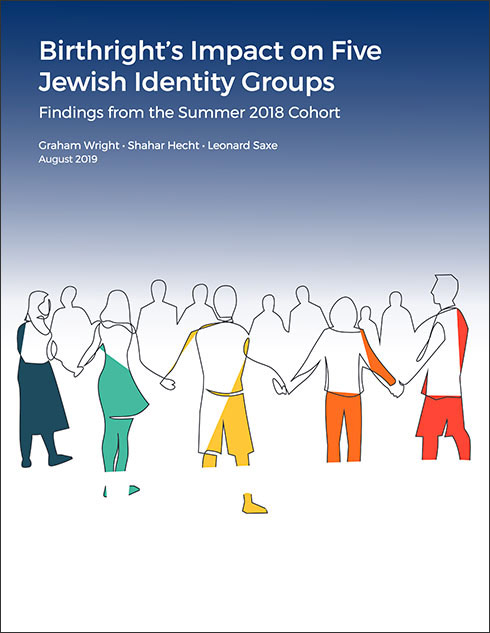
Report
August 2019
By examining response patterns to questions about Jewish attitudes, the study identified five different types of Jewish identity among the young adults who applied to go on a Birthright trip in summer 2018: Ancestry, Secular Peoplehood, Casual Religious, Connected, and Committed. After sorting applicants into groups corresponding to their Jewish identity type, the study examined the ways in which participants in the different groups were impacted by their Birthright experience.
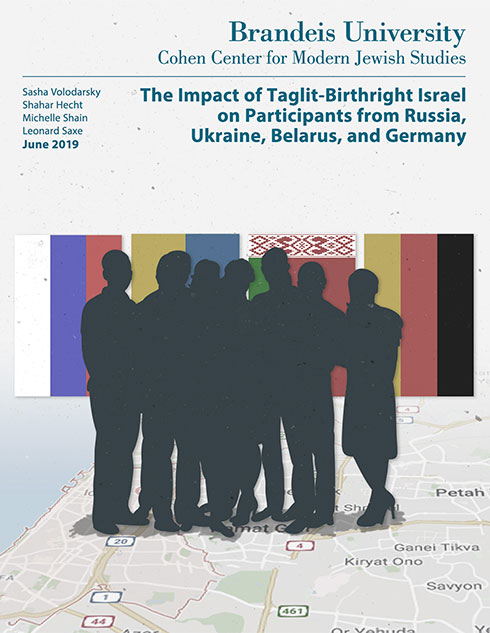
Report
June 2019
This study focuses on two groups of Birthright Israel participants: first, those from Russia, Ukraine, and Belarus and second, Russian-speaking Jews (RSJ) in Germany. It is part of a larger program of research designed to understand the impact of Birthright Israel (known in the FSU and Germany as Taglit) on its participants. The study draws on pre- and post-trip surveys of the summer 2017 cohort from these countries, as well as on a long-term survey of participants from Russia and Ukraine who participated in the program during 2010-14.
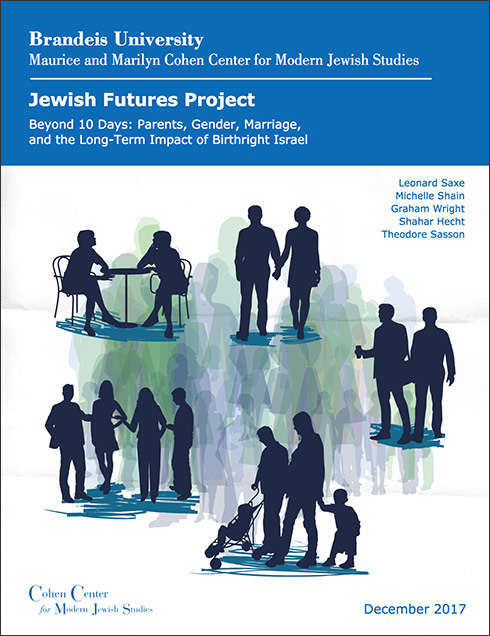
Report
December 2017
The report presents findings from the 5th wave of a longitudinal study of several thousand Jewish young adults who applied to Birthright between 2001 and 2009 and includes an analysis of the ways in which Birthright’s impact manifests in different subgroups: those with one versus two Jewish parents, those whose sole Israel experience was a Birthright trip, participants who are single versus partnered, and men versus women.
Journal article
May 2017
Janet Krasner Aronson
This study assesses the impact of Birthright Israel on parents of participants—in particular, on the ways in which parents’ indirect exposure to their adult children’s experiences in the program affect those parents’ connections to Israel. Contemporary Jewry (2017) 37:405–431
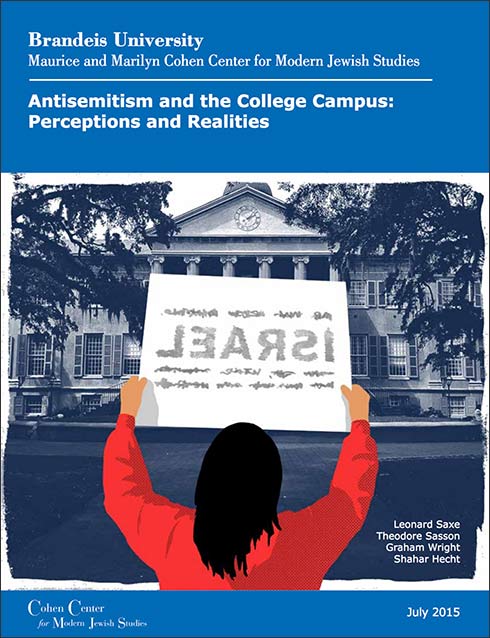
Report
July 2015
In the wake of the Israel-Hamas war in summer 2014, US and Canadian college campuses were the settings for many anti-Israel activities, including the Boycott, Divestment, and Sanctions (BDS) campaign. This study attempts to understand the extent of hostility toward Israel and antisemitism on North American campuses and assess the relationship between these trends and Jewish students’ support for and connection to Israel.
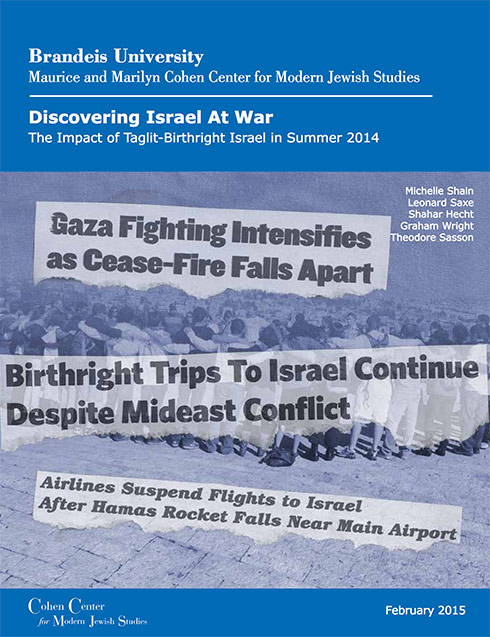
Report
February 2015
This report focuses on findings from a study of Taglit-Birthright summer 2014 applicants and participants and the degree to which the change in the applicant pool affected perceptions of the trip experience, the impact of the trip itself on connection to Israel and sense of Jewish identity, and the impact of the conflict in Gaza on trip experiences and trip impact.
Journal article
November 2014
Theodore Sasson, Michelle Shain, Shahar Hecht, Graham Wright, and Leonard Saxe (2014)
Nationalism and Ethnic Politics 20 (4): 438-454
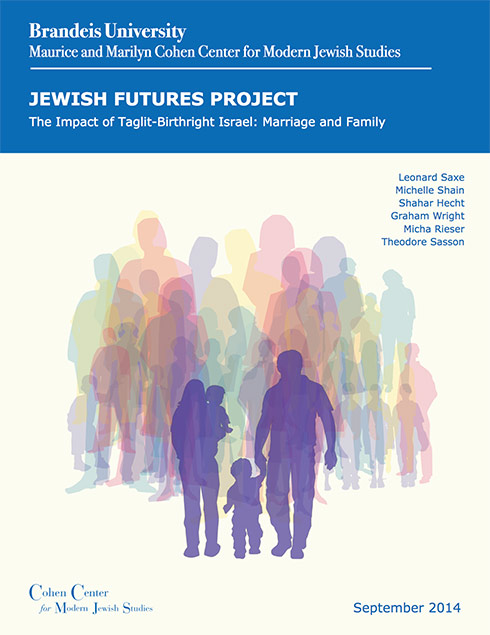
Report
September 2014
The findings in this report were derived from data collected in 2013 for the fourth wave of the Jewish Futures Project, a longitudinal study of Jewish young adults. The expanded number of panelists with families allows for new analyses of marriage patterns and child rearing, including the study of applicant subgroups (e.g., children of intermarried parents).
Report
August 2014
This study examines the reactions of a diverse group of Jewish young adults (applicants to Taglit-Birthright Israel) to the 2014 conflict in Gaza. The report compares their responses to the opinions of young adults in the United States.
Report
February 2014
This study attempts to better understand the current Taglit-Birthright Israel application experience. The sample for this study was drawn from all applicants to Taglit in 2013. The report examines the motivations for applying to Taglit, for selecting a particular trip, and the possible reasons for not going on the trip. For those who participated in a 2013 trip, the survey also assessed their overall trip experience.
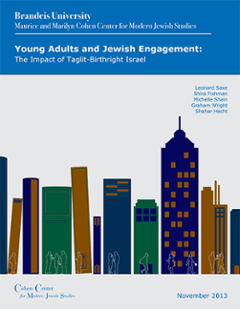
Report
November 2013
This report looks at the short and medium-term impact of Taglit-Birthright as seen during the emerging young adult phase of life--the period immediately after the trips and the first few years that follow. The study focuses, in particular, on attitudes toward Jewish life and participation in Jewish activities.
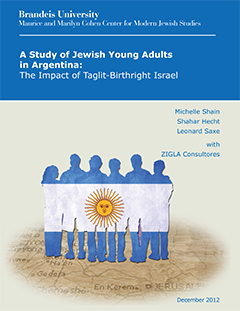
Report
December 2012
The report examines Argentinean Jewish young adults’ demographic characteristics and current Jewish identity and practices. The report also focuses on participants’ thoughts about their Taglit experience and explores the trip’s impact on their lives after their return to Argentina. This report is based on data collected in a survey of individuals who applied to Taglit in 2010 from Argentina. Read the report in Spanish.
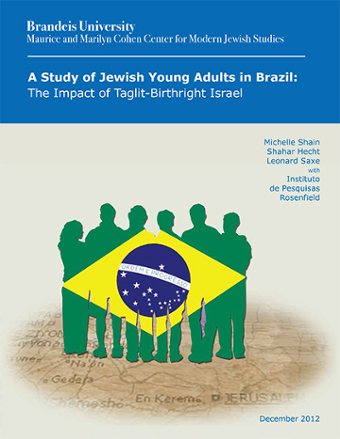
Report
December 2012
This report describes Brazilian Jewish young adults’ contemporary lives, including measures of Jewish identity and behavior. The report also focuses on participants’ thoughts about their Taglit experience and explores the trip’s impact on their lives after their return to Brazil. This report is based on data collected in a survey of individuals who applied to Taglit in 2010 from Brazil.
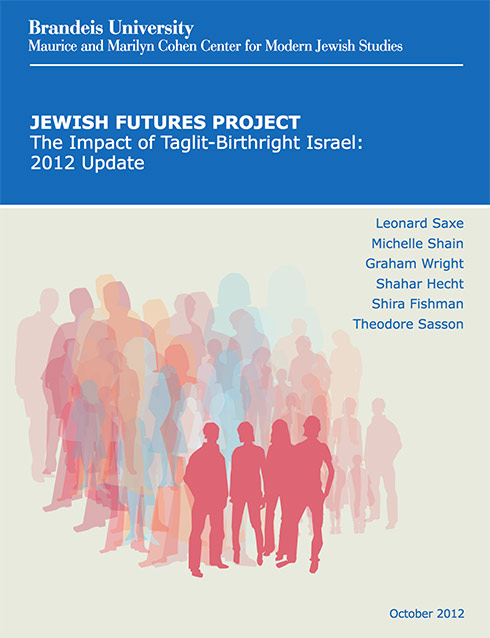
Report
October 2012
The impact of Taglit-Birthright Israel on its alumni six to eleven years after their trip to Israel is examined in this study. The data are derived from the third year of a longitudinal study of Jewish young adults.
Report
November 2011
Key to understanding the impact of Taglit-Birthright Israel is whether participants return to Israel. The report summarizes recent data about Canadian and U.S. Taglit participants, both in terms of their patterns of trip extensions, as well as their return trips to Israel.
Journal article
2011
Leonard Saxe, Benjamin Phillips, Theodore Sasson, Shahar Hecht, Michelle Shain, Graham Wright and Charles Kadushin
Contemporary Jewry, 31 (2): 151-172
Journal article
2011
Theodore Sasson, David Mittelberg, Shahar Hecht, and Leonard Saxe
Journal of Diaspora, Indigenous and Minority Education, 5, 178-197.
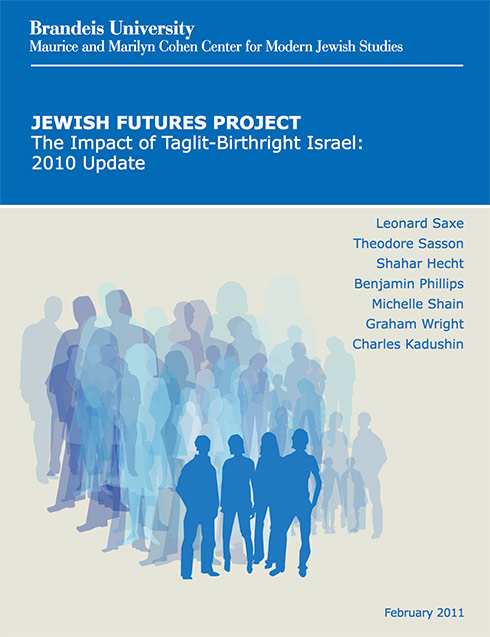
Report
February 2011
This report examines the impact of Taglit-Birthright Israel on its alumni five to nine years after their visits to Israel. The data are derived from the second year of a longitudinal study of Jewish young adults.
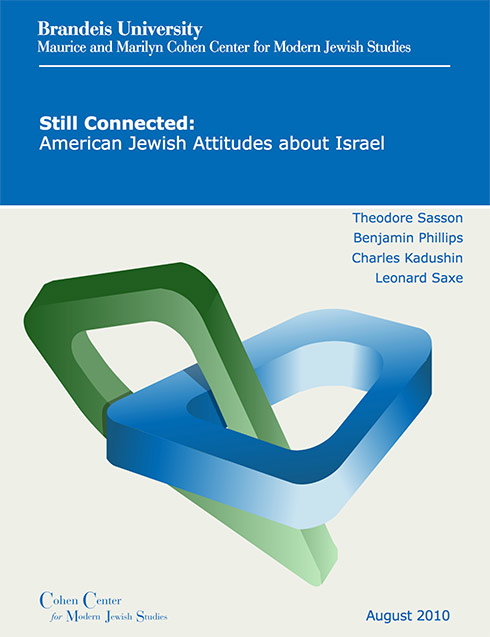
Report
August 2010
To assess American Jewish views about Israel, a survey was conducted in June 2010 of more than 1,200 individuals who were identified as Jewish in a large national panel. The survey explores American Jewish attachment to Israel, in particular in the younger generation.
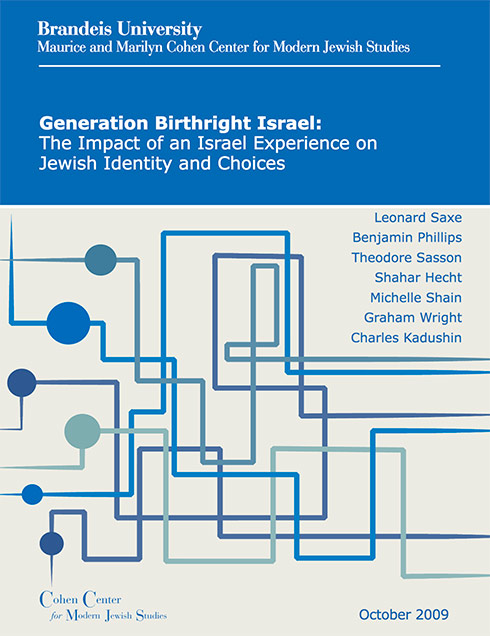
xx
Report
October 2009
This report represents the first long-term study of Taglit-Birthright Israel alumni to document the program's impact on early participants and their decisions and attitudes regarding marriage, community, and connection to Israel.
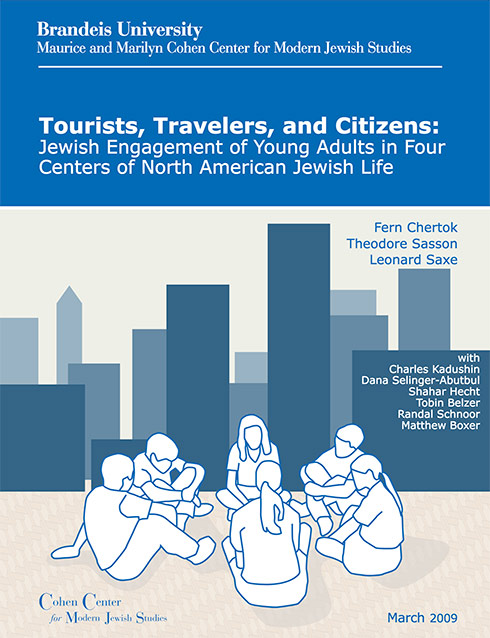
Report
March 2009
Drawing on survey, focus group, and interview data, the report develops a portrait of Jewish young adult life in four of the largest Jewish communities in North America: Los Angeles, New York, San Francisco, and Toronto.
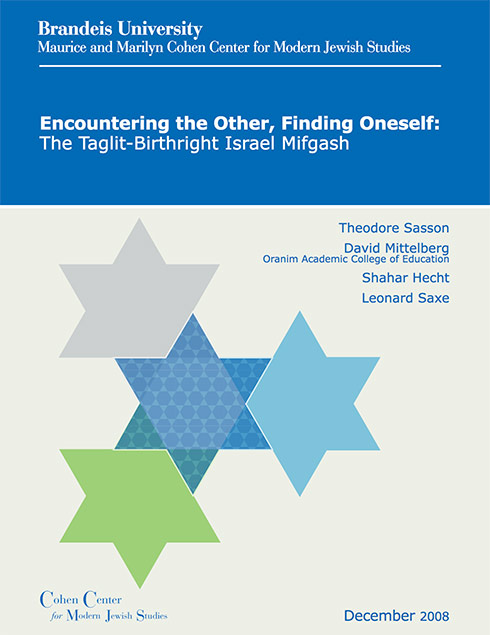
Report
December 2008
Since its inception nine years ago, more than 30,000 Israeli young adults have also experienced Birthright Israel. This report aims to improve understanding of the formal and informal components of the mifgash (encounter), as well as the significance of the experience for North American and Israeli participants.
Report
December 2008
This report focuses on the North American cohort of nearly 60,000 young adults who participated in Birthright Israel trips in summer 2007 and winter 2007-08. Included in the report is a description of applicant characteristics and an analysis of the reactions of program participants to the program at approximately three months post trip.
Journal article
May 2008
Theodore Sasson and Shaul Kelner
Israel Studies, Volume 13, number 2, 146-163
Zionist collective memory has long associated Masada with the struggle to secure Jewish sovereignty over the land of Israel. This article examines the effects of the political upheavals of the Oslo and post-Oslo periods on the meanings ascribed to Masada and documents the popularity of a critical counter-narrative in tour guides’ presentations of Masada to diaspora Jewish tourists.
Report
February 2008
Widespread concern exists within the American Jewish community about declining American Jewish attachment to Israel. Concern has been fueled by social scientific analyses which, both conceptually and empirically, suggest declining attachment. The present paper examines these arguments, along with evidence from national surveys conducted over several decades, and critically assesses the emerging narrative about American Jewry’s growing distance from Israel.
Presentation
January 2008
Presentation to the 8th Annual Herzliya Conference, Herzliya, Israel
This presentation goes beyond data about the success of Taglit as an educational project and seeks to draw a set of four more complex lessons about the Jewish, Diaspora and Israeli future.
Report
December 2007
The present report seeks to examine the extent to which program alumni find adequate means to express their heightened interest in Jewish life on their campuses and in their communities. The post trip experience of program alumni was assessed through focus group interviews on campuses and in communities.
Report
December 2007
The present report describes the North American cohort that participated in Birthright Israel trips during winter 2007 (December 2006 through February 2007). Applicant characteristics are described and reactions of participants to the program approximately three months post trip are analyzed. The Jewish attitudes and behaviors of participants and nonparticipants are compared.
Report
November 2006
Israel’s war against Hezbollah during July and August, 2006, provided a context for assessing the impact of programs bringing Jewish students and young adults to Israel. How did American Jewish young adults who participated in such programs respond during the war and how do they compare to their peers who had not traveled to Israel on a peer-oriented program?
Report
June 2006
This report describes the results of a survey conducted between April – May, 2006, of nearly 3000 birthright israel participants and nearly 1,000 nonparticipant applicants from cohorts in 2002/3, 2003/4 and 2005.
Report
November 2004
This report summarizes two studies. Study 1 presents the findings of a long-term follow-up of early participants in the program. Data were collected from participants and non-participants both before and after trips that took place during the winters of 1999-2000 through 2001-02. This was followed by a follow-up survey beginning in November 2003 to ascertain the program’s effects after several years. Study 2 assesses the short-term effects of the birthright israel trips held during the winter of 2003-04.
Report
January 2002
This report assesses the extent to which birthright israel has succeeded in affecting the lives of participants one year after the first set of trips concluded.
Presentation
December 2001
Paper Presented at the 33rd Annual Meeting of the Association for Jewish Studies
Tourism is commonly dismissed as shallow, frivolous and inauthentic. When an Israel experience program known as Taglit sought to use tourism for the purposes of Jewish education, the standard criticisms made of tourism were also applied to it. In spite of this, participants on Taglit generally felt they had an authentic and profound Jewish experience on the program. To explore how this could have happened in the face of expert predictions to the contrary, Kelner adopts a constructivist notion of authenticity.
Report
November 2001
This report looks at participants three months and one year after the first Birthright Israel trips.
Presentation
August 2001
Paper Presented at the 96th Annual Meeting the American Sociological Association Anaheim, California
This paper analyses the shift from constructivist to existentialist conceptions of authenticity in tourism. Utilizing ethnographic data from a study of a Jewish-American pilgrimage tours to Israel, Kelner argues that a shared narrative linking observer and observed can resolve the dichotomy between constructivist and existentialist notions of authenticity.
Report
November 2000
To understand what Taglit participants experienced, a team of ethnographers conducted detailed participant observation of over a dozen diverse Birthright Israel groups. The findings reinforce the results of the surveys and help us understand why the trips seem to have such great impact.
Report
August 2000
In January 2000, nearly 5000 college students and young adults from Diaspora Jewish communities participated in the launch of Birthright Israel. This report summarizes the findings of a preliminary evaluation of Birthright Israel. Along with the results of a preliminary survey of participants conducted one month post-trip, the present report describes the results of a detailed survey of participants and nonparticipants conducted three months post-trip.